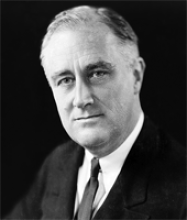False Parallels Between FDR Electrification and Obama Broadband Stimulus
The SF Examiner is the latest to miss the key point when comparing FDR's rural electrification programs with the Obama Administration's broadband stimulus. Though both programs did extend essential infrastructure to communities either unserved or underserved, an important differentiator is how they approached it.
Seventy years ago, President Franklin Delano Roosevelt realized that if private industry wouldn't run power lines out to the farthest reaches of rural areas, it would take government money to help make it happen. In 1935, the Rural Electrification Administration was established to deliver electricity to the Tennessee Valley and beyond.
But it wasn't just government money that was needed, it was a focus on local self-reliance -- which is what I wrote in a Letter to the Editor submitted to the paper:
Your article rightly notes that many Americans need help in building the broadband networks they need. But it draws a false comparison between FDR's electrification efforts and Obama's Stimulus.
FDR correctly recognized that the private sector is ill-suited to running the infrastructure needed in rural communities and used loans to fund cooperatives that would allow communities to be locally self-reliant.
Obama's stimulus program was a mix of loans and grants (heavy on grants) to mostly private sector for-profit companies that will have less incentive to run the networks in ways that most benefit the communities (upgrades, customer service).
If Obama had learned from FDR, his Administration would have embraced a fiscally responsible approach that encouraged local self-reliance by building networks that are structurally accountable to the communities they serve.




